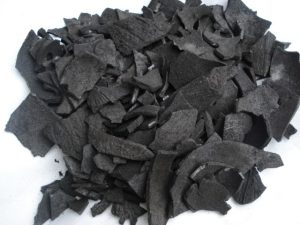
1. Origin and Key Production Regions
Coconut shell charcoal is produced from coconut shells after the flesh and water have been removed. The charcoal production process typically involves burning coconut shells in an anaerobic (oxygen-deficient) environment to create charcoal. This helps retain a high carbon content and produces high-quality charcoal.
Provinces with large coconut growing areas in Vietnam are also the key coconut shell charcoal production regions. These include provinces in the Mekong Delta such as:
- Ben Tre: Dubbed the “coconut capital” of Vietnam, Ben Tre has the largest coconut output in the country, leading to an abundant supply of coconut shells, which forms a solid foundation for the coconut shell charcoals industry.
- Tien Giang, Tra Vinh, Soc Trang, Bac Lieu: These provinces also have significant coconut cultivation areas, contributing to the raw material supply for coconut shell charcoals production.

2. Economic Value Brought
Coconut shell charcoal brings significant economic value, not only to farmers but also to manufacturing and exporting businesses:
- Creates additional income for farmers: Coconut shells, once a byproduct of the coconut industry, are now fully utilized, providing farmers with a stable additional income source.
- Develops ancillary industries: Coconut shell charcoal production promotes the development of small and medium-sized production facilities, creating jobs for local laborers.
- High added value: From raw coconut shells, through processing, coconut shell charcoals can be transformed into various products such as activated carbon, BBQ charcoal, and shisha charcoal, bringing higher economic value.
- Potential export commodity: Vietnamese coconut shell charcoals is highly valued for its quality and is steadily expanding its export markets.
3. Environmentally Friendly Product
One of the most outstanding advantages of coconut shell charcoals is its environmental friendliness:
- Recycles agricultural byproducts: Coconut shell charcoals is made from coconut shells, an agricultural waste product, helping to reduce waste and maximize resource utilization.
- Burns cleanly, less smoke, less ash: Compared to regular wood charcoal, coconut shell charcoals produces significantly less smoke and ash when burned, reducing air pollution.
- Contains no harmful chemicals: The production process of coconut shell charcoals typically does not use chemicals, ensuring safety for users’ health and the environment.
- Renewable fuel source: Coconut trees are perennial crops, providing a sustainable source of raw materials that do not deplete forest resources like logging for wood charcoal.
4. Main Export Markets
With its superior quality and environmental benefits, Vietnamese coconut shell charcoal is highly sought after in many international markets. The main export markets include:
- South Korea and Japan: These are two large and demanding markets that require high product quality. Vietnamese coconut shell charcoals meets these standards and is widely used in BBQ restaurants.
- Middle East (especially UAE, Saudi Arabia): The demand for shisha charcoal is very high in these countries, and coconut shell charcoals, with its long-burning and low-smoke properties, is an ideal choice.
- Europe (especially Germany, Netherlands, France): Coconut shell charcoal is also used in the food industry, entertainment, and as a biomass fuel.
- North America: This market is also gradually realizing the benefits of coconut shell charcoals and is showing a trend of increasing imports.
Other articles:
Other agricultural products:


